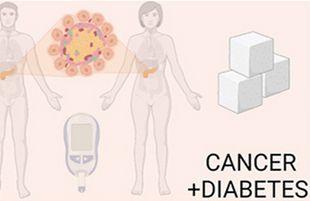Patients with colorectal or pancreatic cancer are at increased risk of cachexia if they also suffer from diabetes. They are more likely to experience loss of adipose tissue and skeletal muscles and their symptoms are more pronounced. They also have a lower probability of survival. This was shown in a study published in the specialist journal ‘Molecular Metabolism’ with the participation of the German Center for Diabetes Research (DZD).
Cancer is increasingly being categorized as a complication of diabetes since it is more common in diabetes patients and worsens their prognosis. In turn, cancer patients often develop cachexia. “Cancer-related cachexia could be viewed as a novel complication of diabetes”, says Dr. Alexandra Chovsepian from the Institute for Diabetes and Cancer at Helmholtz Munich, one of the lead authors of the study. “Diabetes should be specifically taken into account during the clinical management of cachexia”.
To determine the extent to which diabetes influences the onset and progression of cachexia, researchers from the DZD and partner institutes conducted a retrospective investigation of a cohort of 345 patients with colorectal or pancreatic cancer.
Increased Weight Loss, Lower Probability of Survival
They found there was an increased incidence of cachexia among patients with a history of type 2 diabetes. In total, 80% of them developed cachexia. In contrast, the rate for patients without diabetes was 60%.
Regardless of initial weight and tumor progression, the cancer patients also suffering from diabetes lost more weight than those without diabetes (8.9% vs. 6.0%). In addition, their probability of survival was also lower: 50 per cent of patients without diabetes survived an average of 689 days while those with diabetes survived 538 days.
Patients with pancreatic cancer were especially likely to develop cachexia. A subanalysis of the total cohort showed that diabetes reduced the survival rate and resulted in an even greater weight loss (9.95% vs. 6.93%). Furthermore, the hospitalization duration of these patients was also longer (24.41 vs. 15.85 days).

© Mol Metab / Alexandra Chovsepian (DOI: 10.1016/j.molmet.2023.101729)
Systemic Inflammation May Accelerate Emaciation
There are also differences in the laboratory findings: cancer patients with diabetes had higher C-reactive protein (CRP) and interleukin levels and lower serum albumin levels than patients without diabetes. The changes were particularly notable among cachectic cancer patients with diabetes. Their C-reactive protein levels increased up to 2.300 µg/ml whereas the level for non-diabetic patients was 0.808 μg/ml
“The significant elevation of not only the CRP level but also the other inflammatory markers, such as the platelet to lymphocyte ratio, points to more severe systemic inflammation in patients with diabetes and cachexia”, explains Dr. Olga Prokopchuk from the Clinic and Polyclinic for Surgery at University Hospital rechts der Isar, one of the study’s lead authors. “This may promote systemic metabolic dysfunction and further accelerate cachexia.”
Original publication:
Alexandra Chovsepian, Olga Prokopchuk, Gabriela Petrova, Tefta Gjini, Hanna Kuzi, Simone Heisz, Klaus-Peter Janssen, Marc E. Martignoni, Helmut Friess, Hans Hauner & Maria Rohm. Diabetes increases mortality in patients with pancreatic and colorectal cancer by promoting cachexia and its associated inflammatory status. Mol Metab 2023 Apr 22; doi.org/10.1016/j.molmet.2023.101729

